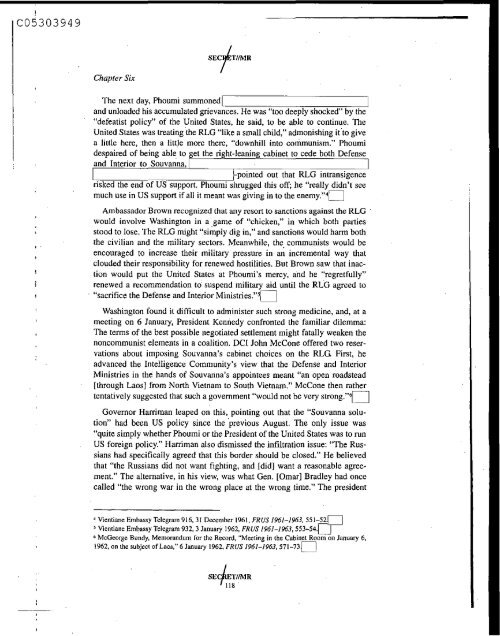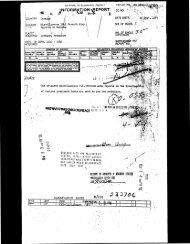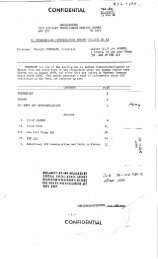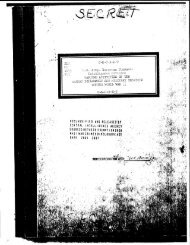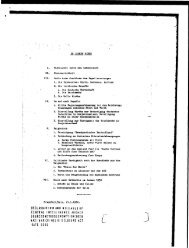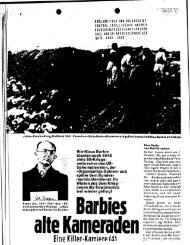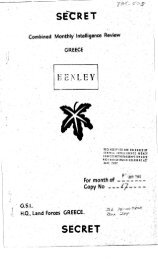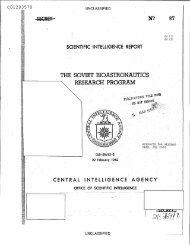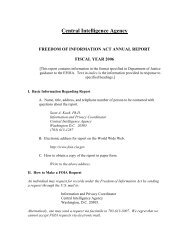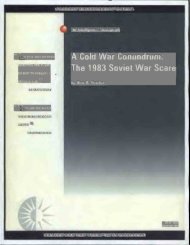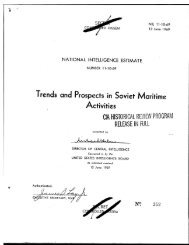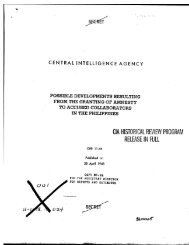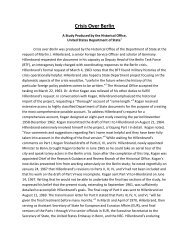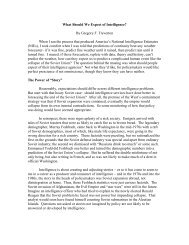- Page 2 and 3:
, C05303949 i (b)(1) (b)(3) i UNDER
- Page 4 and 5:
, : I· C05303949 UNDERCOVER ARMIES
- Page 6 and 7:
C05303949 MAPS Laos ground war, 196
- Page 8 and 9:
C05303949 ABBREVIATIONS BG CASI CAT
- Page 10 and 11:
C05303949 INTRODUCTION The Cork in
- Page 12 and 13:
C05303949 The Agency initially aime
- Page 14 and 15:
C05303949 over covert Laotian opera
- Page 16 and 17:
~------- . ~~~---- ---- - C05303949
- Page 18 and 19:
C05303949 Ii CHI N A T H A I uo. -
- Page 20 and 21:
C05303949 NO'Wi Laos: ROAD CAPACITI
- Page 22 and 23:
C05303949 Laos; The iUr War 1964-19
- Page 24 and 25:
I C05303949 UNDERCOVER ARMIESD
- Page 26 and 27:
I I C05303949 PROLOGUE Despite a ch
- Page 28 and 29:
I I CO~303949 Chapter One An early
- Page 30 and 31:
Chapter One The communists' 1958 vi
- Page 32 and 33:
I 1, C05303949 EVERYBODY'S PAWND I
- Page 34 and 35:
C05303949 EVERYBODY'S PAWG I I' Sih
- Page 36 and 37:
C05303949 EVERYBODY'SPAWND The only
- Page 38 and 39:
CO~303949 , I EVERYBODY'S PAWND mis
- Page 40 and 41:
COSb03949 I II I ItI, Chapter 1\110
- Page 42 and 43:
I C05 1303949 , I,, I I Chapter Two
- Page 44 and 45:
I I I I I I III Chapter Two The man
- Page 46 and 47:
C05 303949 Chapter Two Vientiane, i
- Page 48 and 49:
C051303949 I I Chapter Two Dpartici
- Page 50 and 51:
COSl303949 Chapter Two craft shuttl
- Page 52 and 53:
Chapter Two At this point, Stu Meth
- Page 54 and 55:
Chapter Two did not occur. Vang Pao
- Page 56 and 57:
C05303949 Chapter Two and providing
- Page 58 and 59:
COSl303949 Chapter Two , . I -r II
- Page 60 and 61:
COSl303949 Chapter Two SEC~IMR offe
- Page 62 and 63:
CHAPTER THREE Iron Age GuerrillasD
- Page 64 and 65:
C05303949 IRON AGE GUERRlUAs[] Toge
- Page 66 and 67:
COSl303949 I III IRON AGE GUERRILLA
- Page 68 and 69:
I C05 1303949 I I . SE!RET/fMR IRON
- Page 70 and 71:
I C05303949 I Target: KongLeD IRONA
- Page 72 and 73:
I C05803949 I I ! II IRON AGE GUERR
- Page 74 and 75:
ffiONAGEGUERIDUASc=] neutralists ha
- Page 76 and 77:
I C05303949 I I I IRONAGE GUERRIUAS
- Page 78 and 79:
I C05303949 I IiI I I, I IRONAGE GU
- Page 80 and 81:
C051303949 I i I I I IiI I I II I I
- Page 82 and 83:
COSl303949 I I III I SEcr- T1fMR IR
- Page 84 and 85:
COSb03949 I II i I I fflONAGEGUERmU
- Page 86 and 87:
C051303949 I II I I I I I I I I rel
- Page 88 and 89: lexcitedly 1 _ I C05303949 , I IRON
- Page 90 and 91: COSl303949 i I Chapter Four lose bo
- Page 92 and 93: CO~303949 I I I I i Chapter Four Sa
- Page 94 and 95: I I C05303949 I Ii I I I i I Chapte
- Page 96 and 97: I C05303949 I I I I I Chapter Four
- Page 98 and 99: I C05303949 i i I I I II I II I I I
- Page 100 and 101: I C05303949 I I iI I I II I I I I I
- Page 102 and 103: C05303949 I II I I i ! I I II I I I
- Page 104 and 105: I C05303949 i, i I I I ! I Chapter
- Page 106 and 107: C05303949 Chapter Four t'uth III II
- Page 108 and 109: C05303949 Chapter Four Photo fmm un
- Page 110 and 111: I I iCO~303949 , I I I Chapter Four
- Page 112 and 113: I C05303949 I I Chapter Four antico
- Page 114 and 115: C05 303 94 9 Chapte r Five ttelio -
- Page 116 and 117: C05303949 Chapter Five STOL aircrof
- Page 118 and 119: I C05303949 I I Chapter Five No amo
- Page 120 and 121: I C05303949 Chapter Five , I. i I I
- Page 122 and 123: I C05303949 , Chapter Five under th
- Page 124 and 125: I I C05303949 SECrT/fMR Chapter Fiv
- Page 126 and 127: C05303949 Chapter Five There was al
- Page 128 and 129: I C05303949 Chapter Five Beating th
- Page 130 and 131: C053 0 394 9 Chapter F ;\'e Entranc
- Page 132 and 133: C05303949 SECrTlfMR Chapter Five In
- Page 134 and 135: C05303949 Chapter Five .1 of surviv
- Page 136 and 137: C05303949 SECrTlfMR· Chapter Five
- Page 140 and 141: C05303949 Chapter Six Ambassador Br
- Page 142 and 143: , . , C05303949 Chapter Six largely
- Page 144 and 145: C05303949 Chapter Six But neither t
- Page 146 and 147: , C05303949 Chapter Six The princes
- Page 148 and 149: C05303949 Chapter Six I . the Hmong
- Page 150 and 151: C05303949 Chapter Six Given the his
- Page 152 and 153: C05303949 Chapter Six Even more to
- Page 154 and 155: C05303949 Chapter Seven In fact, th
- Page 156 and 157: C05303949 . Chapter Seven The 75 da
- Page 158 and 159: 1 ';" "'------------------------ C0
- Page 160 and 161: C05303949 Chapter Seven uneasy, and
- Page 162 and 163: C05303949 Chapter Seven Gen. Phasou
- Page 164 and 165: C05303949 Chapter Seven For Yang Pa
- Page 166 and 167: C05303949 Chapter Seven Even if~ do
- Page 168 and 169: C05303949 Chapter Seven I ~dmiral F
- Page 170 and 171: C05303949 Chapter Seven their rule
- Page 172 and 173: C05303949 Chapter Seven Union on th
- Page 174 and 175: C05303949 Chapter Seven of Pines, i
- Page 176 and 177: C05303949 Chapter Seven Hanoi, whil
- Page 178 and 179: C05303949 Chapter Seven on the grou
- Page 180 and 181: C05303949 CHAPTER EIGHT A Limited O
- Page 182 and 183: C05303949 A LIMITED OFFENS/VED bomb
- Page 184 and 185: C05303949 A LIMITED OFFENSIVG . the
- Page 186 and 187: C05303949 A LIMITED OFFENSIVED wing
- Page 188 and 189:
C05303949 A ustrtrn OFFENSI\ 'f. te
- Page 190 and 191:
C05 30 3 949 A UMITf..D OFFEXSI\ 'E
- Page 192 and 193:
C05303949 A LIMITED OFFENSIVED supp
- Page 194 and 195:
C05303949 A UMrrEI> OFH.N SI\ 't: I
- Page 196 and 197:
C05303949 a good start.I A LIMITED
- Page 198 and 199:
C05303949 A LIMITED OFFENSIVO 10. A
- Page 200 and 201:
C05 303949 .-\ L/.\fITE[) OFFt:.NS/
- Page 202 and 203:
C05303949 CHAPTER NINE Focus on the
- Page 204 and 205:
C05303949 FOCUS ON THE PANHANDLED I
- Page 206 and 207:
C05303949 FOCUS ON THE PANHANDLED T
- Page 208 and 209:
C05303949 FOCUS ON THE PANHANDLO Ne
- Page 210 and 211:
C05303949 FOCUS ON THE PANHANDLED c
- Page 212 and 213:
C05303949 FOCUS ON THE PANHANDLED C
- Page 214 and 215:
C05303949 FOCUS ON THE PANHANDLED h
- Page 216 and 217:
1 Ihad C05303949 FOCUS ON THE PANHA
- Page 218 and 219:
C05303949 SECrTIIMR FOCUS ON THE PA
- Page 220 and 221:
C05303949 FOCUS ON THE PANHANDLED C
- Page 222 and 223:
C05303949 FOCUS ON THE PANHANDLED T
- Page 224 and 225:
C05303949 FOCUS ON THE PANHANDLE[]
- Page 226 and 227:
C05303949 FOCUS ON THE PANHANDLED G
- Page 228 and 229:
C05303949 CHAPTER TEN In the Shadow
- Page 230 and 231:
C05303949 IN THE SHADOW OF VlETNAMD
- Page 232 and 233:
C05303949 IN THE SHADOW OF VIETNAMD
- Page 234 and 235:
C05303949 IN THE SHADOW OF WETNAMD
- Page 236 and 237:
C05303949 IN THE SHADOW OF VlETNAMD
- Page 238 and 239:
C05303949 IN THE SHADOW OF WETNAMD
- Page 240 and 241:
C05303949 SEcft.'/lMR Colby was not
- Page 242 and 243:
C05303949 IN THE SHADOW OF VlETNAC
- Page 244 and 245:
C05303949 TNTHE SHADOW OF VlETNAMD
- Page 246 and 247:
C05303949 SEi rrrllMR /,,,/ THE SHA
- Page 248 and 249:
C05 303 949 IN THE SIIAI>OU' (JF \
- Page 250 and 251:
C05303949 CHAPTER ELEVEN On the Fro
- Page 252 and 253:
C05303949 SErT1fMR ON THE PROKIUNE
- Page 254 and 255:
C053039 49 ov THE FRO'vTLll\'E IX S
- Page 256 and 257:
C05303949 ON TIlE FRONTUNE IN SAAI
- Page 258 and 259:
C05303949 SEt T/IMR ON THE FRONTLIN
- Page 260 and 261:
1 C05303949 '1"~'ON THE FRONTLINE I
- Page 262 and 263:
C05303949 os TIlE FROSTUNf: IN StUI
- Page 264 and 265:
C05303949 SEfTllMR ON THE FRONTLINE
- Page 266 and 267:
C05303949 SEr TlfM R ON THE FRONTLI
- Page 268 and 269:
C05303949 SEcfTllMR abled trucks; t
- Page 270 and 271:
C05303949 SE!RETIIMR ON THE FRONTLI
- Page 272 and 273:
C05303949 SEr T1fM R ON THE FRONTLI
- Page 274 and 275:
C05303949 CHAPTER TwELVE Introducti
- Page 276 and 277:
C05303949 SEt T1IMR INTRODUCTION TO
- Page 278 and 279:
C05303949 SEr TlfM R INTRODUCTION T
- Page 280 and 281:
C05303949 SEcjETlfMR INTRODUCTIONTO
- Page 282 and 283:
C05303949 SE7ETlfMR INTRODUCTIONTO
- Page 284 and 285:
C05303949 SECfTlfMJI. INTRODUCTION
- Page 286 and 287:
C05303949 SEiRET/lMR INTRODUCTIONTO
- Page 288 and 289:
C05303949 ~R INTRODUCTIONTO INTERDI
- Page 290 and 291:
C05303949 SEt T1fM R INTRODUClION T
- Page 292 and 293:
C05303949 Chapter Thirteen Adm. U.S
- Page 294 and 295:
C05303949 Chapter Thirteen' I I Iwe
- Page 296 and 297:
C05303949 • Chapter Thirteen said
- Page 298 and 299:
C05303949 Chapter Thirteen With his
- Page 300 and 301:
C05303949 Chapter Thirteen "Lamplig
- Page 302 and 303:
C05303949 Chapter Thirteen Miss.ion
- Page 304 and 305:
Ic05303949 Chapter Thirteen als Oua
- Page 306 and 307:
C05303949 Chapter Thirteen The emph
- Page 308 and 309:
C05303949 Chapter Thirteen eral pas
- Page 310 and 311:
·C05303949 Chapter Thirteen to man
- Page 312 and 313:
C05303949 CHAPTER FOURTEEN A Holdin
- Page 314 and 315:
C05303949 A HOLDJNGOPEMnON~ Lair sa
- Page 316 and 317:
C05303949 A IIOUJ/NG OPERATlON 'rlm
- Page 318 and 319:
C05303949 A HOLDING OPERATlOND ing
- Page 320 and 321:
C05303949 A HOLDINGOPERATIOND. The
- Page 322 and 323:
C05303949 A HOLDING OPERATIOND at h
- Page 324 and 325:
C05303949 A HOWING OPERATIOU The tr
- Page 326 and 327:
C05303949 A HOLDING OPERATIOND Defe
- Page 328 and 329:
C05303949 A HOLDING OPERATIOND Hmon
- Page 330 and 331:
C05303949 A HOLDING OPliRA11OND The
- Page 332 and 333:
C05303949 A HOLDING OPERATIOND to b
- Page 334 and 335:
C05303949 A HOLDING OPERATIOND scen
- Page 336 and 337:
C05303949 A HOLDING OPERATIOND must
- Page 338 and 339:
C05303949 Chapter Fifteen uJars. If
- Page 340 and 341:
C05303949 Chapter Fifteen until two
- Page 342 and 343:
C05303949 Chapter Fifteen Having fa
- Page 344 and 345:
C05303949 Chapter Fifteen communist
- Page 346 and 347:
C05303949 Chapter Fifteen Payingfor
- Page 348 and 349:
C05303949 Chapter Fifteen tions nor
- Page 350 and 351:
C05303949 Chapter Fifteen Muong Sou
- Page 352 and 353:
C05303949 Chapter Fifteen I ILarry
- Page 354 and 355:
C05303949 Chapter Fifteen s 10 X1"
- Page 356 and 357:
C05303949 - Chapter Fifteen There w
- Page 358 and 359:
C05303949 Chapter Fifteen • IlIl
- Page 360 and 361:
C05303949 Chapter Fifteen Vcm~ PIlI
- Page 362 and 363:
C05303949 CHAPTER SIXTEEN Taking th
- Page 364 and 365:
C05303949 SF;hTlfMR TAKING THE WAR
- Page 366 and 367:
C05303949 SECrTlfMR TAKINGTHE WARTO
- Page 368 and 369:
C05303949 SEr T/fM R TAKING THE WAR
- Page 370 and 371:
C05303949 SECfT/lMR TAKING THE WART
- Page 372 and 373:
C05303949 SErT/lMR TAKING THE WAR T
- Page 374 and 375:
C05303949 SErETlfMR TAKING THE WAR
- Page 376 and 377:
C05303949 TAAO/NG THE Ui\ R TO TI l
- Page 378 and 379:
C05303949 SEtETIIMR TAKING TIlE WAR
- Page 380 and 381:
C05303949 SEfT/lMR TAKING THE WAR T
- Page 382 and 383:
C05303949 SE!RETIIMR TAKING THE WAR
- Page 384 and 385:
C05303949 SE7ETlfMR TAKING THE WAR
- Page 386 and 387:
C05303949 Chapter Seventeen FAR and
- Page 388 and 389:
C05303949 Chapter Seventeen 'I '."I
- Page 390 and 391:
C05303949 Chapter Seventeen "I r I
- Page 392 and 393:
C05303949 Chapter Seventeen SEriETl
- Page 394 and 395:
C05303949 Chapter Seventeen A New S
- Page 396 and 397:
C05303949 Chapter Seventeen levels,
- Page 398 and 399:
C05303949 Chapter Seventeen Meanwhi
- Page 400 and 401:
C05303949 Chapter Seventeen The sta
- Page 402 and 403:
C05303949 Chapter Seventeen Long Ti
- Page 404 and 405:
------------ C05303949 Chapter Seve
- Page 406 and 407:
C05303949 Chapter Seventeen The moo
- Page 408 and 409:
C05303949 Chapter Seventeen . Headq
- Page 410 and 411:
C05303949 Chapter Seventeen The var
- Page 412 and 413:
C05303949 • Chapter Seventeen' Th
- Page 414 and 415:
C05303949 Chapte r Seventeen The CO
- Page 416 and 417:
C05303949 I Chapter Seventeen ]Defe
- Page 418 and 419:
C05303949 CHAPTER EIGHTEEN Sting Li
- Page 420 and 421:
C05303949 STING LIKEA BEllO Meanwhi
- Page 422 and 423:
C05303949 sttno LIKE A BEED Alludin
- Page 424 and 425:
C05303949 STING UKE A BEED American
- Page 426 and 427:
C05303949 STING LIKEA BEO The Neo L
- Page 428 and 429:
C05303949 STING LIKE A BEED the ope
- Page 430 and 431:
C05303949 STING UKE A BEG Even the
- Page 432 and 433:
C05303949 Chapter Nineteen The sess
- Page 434 and 435:
" .", I ,----,-------,-_ C05303949
- Page 436 and 437:
C05303949 Chapter Nineteen _..., ..
- Page 438 and 439:
C05303949 Chapter Nineteen \ high g
- Page 440 and 441:
C0530 3949 Chapter Nineteen rff'?1c
- Page 442 and 443:
C05303949 Chapter Nineteen Unleashi
- Page 444 and 445:
C05303949 Chapter Nineteen Nelson's
- Page 446 and 447:
C05303 949 Chapter Nineteen - . Oo,
- Page 448 and 449:
C05303949 Chapter Nineteen Long Tie
- Page 450 and 451:
C05303949 Chapter Nineteen Tovar re
- Page 452 and 453:
C05303949 , '"'f1l;lbu Pha Sal ....
- Page 454 and 455:
C05303949 Chapter Twenty The fate o
- Page 456 and 457:
C05303949 Chapter Twenty Vir\\' m-r
- Page 458 and 459:
C05303949 Chapter Twenty b,------ J
- Page 460 and 461:
C05303949 Chapter Twenty / PHOU •
- Page 462 and 463:
C05303949 Chapter Twenty "'Il~_. ..
- Page 464 and 465:
C05303949 Chapter Twenty Weakened b
- Page 466 and 467:
C05303949 Chapter Twenty a box of f
- Page 468 and 469:
C05303949 Chapter Twenty Implicitly
- Page 470 and 471:
C05303949 Chapter Twenty ment's pos
- Page 472 and 473:
C05303949 Chapter Twenty renewed Hm
- Page 474 and 475:
C05 303949 Chapter Twenty I 1 • (
- Page 476 and 477:
C05303949 Chapter Twenty ing in Nor
- Page 478 and 479:
C05303949 Chapter Twenty .F' . ~ -
- Page 480 and 481:
C05303949 Chapter Twenty The Perenn
- Page 482 and 483:
C05303949' Chapter Twenty In what h
- Page 484 and 485:
C05303949 Chapter Twenty It had bee
- Page 486 and 487:
C05303949 Chapter Twenty OPERATION
- Page 488 and 489:
C05303949 Chapter Twenty ,.. BAN BU
- Page 490 and 491:
C05303949 Chapter Twenty I I had fo
- Page 492 and 493:
C05303949 1973-75 The Paris Agreeme
- Page 494 and 495:
C05303949 Chapter Twenty-one repres
- Page 496 and 497:
C05303949 Chapter Twenty-one ____Id
- Page 498 and 499:
C05303949 Chapter Twenty-one Despit
- Page 500 and 501:
C05303949 Chapter Twenty-one compla
- Page 502 and 503:
C05303949 Chapter Twenty-one . Mean
- Page 504 and 505:
C05303949 :'1 SEefTIIMR Chapter Twe
- Page 506 and 507:
,C05303949 Chapter Twenty-one offer
- Page 508 and 509:
C05303949 Chapter Twenty-one FAR co
- Page 510 and 511:
C05303949 Chapter Twenty-one There
- Page 512 and 513:
C05303949 Chapter Twenty-one ters f
- Page 514 and 515:
C05303949 Chapter Twenty-one politi
- Page 516 and 517:
C05303949 Chapter Twenty-one From i
- Page 518 and 519:
C05303949 Chapter Twenty-one the NV
- Page 520 and 521:
C05303949 Chapter Twenty-one sion.]
- Page 522 and 523:
C05303949 CHAPTER TwENTY-TWO Going
- Page 524 and 525:
C05303949 GOING THE WAY OFVIETNAMD
- Page 526 and 527:
C05303949 GOING THE WAY OF VIETNAMD
- Page 528 and 529:
C05303949 SEfT/~R GOING THE WAY OF
- Page 530 and 531:
C05303949 GOING THE WAYOF VIETNAU T
- Page 532 and 533:
C05303949 GOING THE WAYOF WETNAMD B
- Page 534 and 535:
C05303949 GOING THE WAY OF VIETNAMD
- Page 536 and 537:
C05303949 GOING THE WAY OF VIETNAMD
- Page 538 and 539:
C05303949 Chronology July - Geneva
- Page 540 and 541:
C05303949 Chronology 1974 5 April -
- Page 542 and 543:
C05303949 Appendix The hill tribes
- Page 544 and 545:
C05303949 Appendix In September 196
- Page 546 and 547:
C05303949 Appendix The recollection
- Page 548 and 549:
C05303949 Appendix nearby and heade
- Page 550 and 551:
C05303949 SEfRJ!.TIIMR . Appendix T
- Page 552 and 553:
C05303949 Appendix .~R transactions
- Page 554 and 555:
C05303949 SOURCE NOTE AND SUGGESTED
- Page 556 and 557:
C05303949 Lap, Doan Manh and Do Quo
- Page 558 and 559:
C05303949 Index narcotics, 540, 542
- Page 560 and 561:
C05303949 Index I 117,118,120,121,1
- Page 562 and 563:
C05303949 Index guidance to field (
- Page 564 and 565:
C'05303949 Index de Silva, Peer, 21
- Page 566 and 567:
C05303949 Index effectiveness, 6, 3
- Page 568 and 569:
C05303949 Index namese, 133, 183, 1
- Page 570 and 571:
C05303949 Index Intelligence Commun
- Page 572 and 573:
C05303949 Index as Secretary of Sta
- Page 574 and 575:
C05303949 Index operations, 343-345
- Page 576 and 577:
C05303949 Index tions,340 Military
- Page 578 and 579:
C05303949 Index 192,531 , operation
- Page 580 and 581:
C05303949 Index Quane Rathikoun, Ge
- Page 582 and 583:
C05303949 Index relations with CIA,
- Page 584 and 585:
C05303949 Index . SE!RETIIMR R (all
- Page 586 and 587:
C05303949 Index 147,215,216 Sam Neu
- Page 588 and 589:
C05303949 Index I and Pathet Lao, 7
- Page 590 and 591:
C05303949 Index I 289,307,313 menti
- Page 592 and 593:
C05303949 Index (Saigon station), 1
- Page 594 and 595:
C05303949 Index 451,455,458,469,485
- Page 596 and 597:
C05303949 Index 493,501,508,522,533


